Over 30 years of anarchist writing from Ireland listed under hundreds of topics
3,000 March in Cork against Household Taxes and Austerity
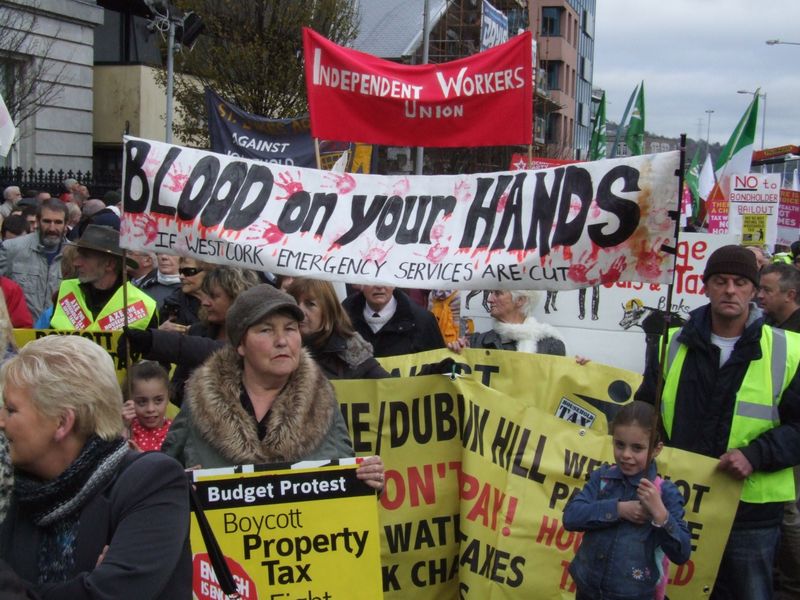
New pro choice campaign emerges at well attended public meeting
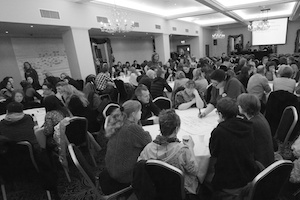 A successful and productive meeting of pro-choice campaigners took place in Dublin city centre Saturday, 8th December 2012. Over 200 people came together in the Gresham Hotel to start building a new campaign for abortion rights in Ireland.
A successful and productive meeting of pro-choice campaigners took place in Dublin city centre Saturday, 8th December 2012. Over 200 people came together in the Gresham Hotel to start building a new campaign for abortion rights in Ireland.
Turn off the Red Light: Should we advocate it?
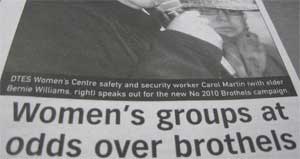 “In Turn off the Red Light – Should We Advocate It?”, T.J., explores the problems faced by sex workers in gaining recognition by those who normally fight for workers rights and outlines how criminalisation of demand has created new problems in countries where that has been introduced.
“In Turn off the Red Light – Should We Advocate It?”, T.J., explores the problems faced by sex workers in gaining recognition by those who normally fight for workers rights and outlines how criminalisation of demand has created new problems in countries where that has been introduced.
Sex and Sex Work from an Anarcha-Feminist perspective
 In “Sex and Sex Work from and anarcha-feminist perspective”, Leticia looks at the theoretical background to the debate between those who argue for decriminalisation and those who “see sex work (or even sex in general) as violence against women”. She argues that because sex is commodified, sex workers should be treated in the same way as others who engage in exploitative labour.
In “Sex and Sex Work from and anarcha-feminist perspective”, Leticia looks at the theoretical background to the debate between those who argue for decriminalisation and those who “see sex work (or even sex in general) as violence against women”. She argues that because sex is commodified, sex workers should be treated in the same way as others who engage in exploitative labour.
Authoritarianism and the early Irish State
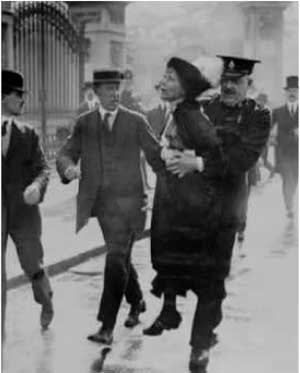 Fin Dwyer looks at the latter years of Ireland’s first post independence government, which having successfully suppressed political opposition and the workers’ movement, went on to “attack women and enforce their moral and ethical values on wider society”. From the clearing of prostitutes from the Monto and the filling of the Magdalene laundries to the institutionalisation of child abuse, he describes how the state’s close association with the Catholic Church played a decisive role in forming attitudes to women and sex that have had a devastating effect on Irish society that can still be felt today.
Fin Dwyer looks at the latter years of Ireland’s first post independence government, which having successfully suppressed political opposition and the workers’ movement, went on to “attack women and enforce their moral and ethical values on wider society”. From the clearing of prostitutes from the Monto and the filling of the Magdalene laundries to the institutionalisation of child abuse, he describes how the state’s close association with the Catholic Church played a decisive role in forming attitudes to women and sex that have had a devastating effect on Irish society that can still be felt today.
Failing to unveil Capitalism at Occupy - Paulo Freire’s Theoretical Framework
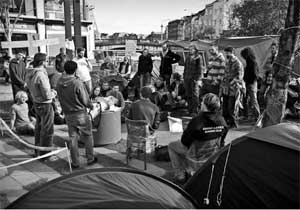 The Occupy movement may have come into our lives just over a year ago with a bang but it went out months later with a whimper. Cathal uses the benefit of hindsight to look at the phenomenon as it manifested itself on these shores and what anarchists could have done to make it work better. The difficulties as Cathal argues did not lie in making arguments for democracy has been the case in so many other campaigns but in that the occupiers “didn’t see this conception extending to the realm of economic production” and in developing the 99%/1% analysis into a deeper class analysis. Recognising problems with current modes of consciousness raising, he utilises Paulo Freire’s pedagogical framework in an attempt to subject “our own political strategies, methodologies and theories to critical scrutiny”.
The Occupy movement may have come into our lives just over a year ago with a bang but it went out months later with a whimper. Cathal uses the benefit of hindsight to look at the phenomenon as it manifested itself on these shores and what anarchists could have done to make it work better. The difficulties as Cathal argues did not lie in making arguments for democracy has been the case in so many other campaigns but in that the occupiers “didn’t see this conception extending to the realm of economic production” and in developing the 99%/1% analysis into a deeper class analysis. Recognising problems with current modes of consciousness raising, he utilises Paulo Freire’s pedagogical framework in an attempt to subject “our own political strategies, methodologies and theories to critical scrutiny”.
Not Waving but Drowning: Precarity and the Working Class

In ‘Not Waving but Drowning: Precarity and the Working Class’, Mark Hoskins takes a critical look at the idea put forward by some academics and even parts of the anti-capitalist movement that the “precariat” is the revolutionary subject of our epoch. After examining the subjective conditions of the precarious subject today and comparing its objective conditions to those of the working class of the last century, he goes on to explore how these conditions relate to our end goal, a communist society and what lessons that can teach us in our attempt to get there.
Rethinking Class: From Recomposition to Counterpower
 In Paul Bowman’s article ‘Rethinking Class: From Recomposition to Counter-Power’, he poses the question “Is class still a useful idea?” or “should we instead just dispense with it and go with the raw econometrics of inequality?” He draws a line between revolutionary class analysis and universalist utopianism and goes on to explore the history of different ideas of class and the elusive revolutionary subject. After exploring the intersecting lines of class and identity, he poses the challenge that we as libertarians face as we strive to create “cultural and organisational forms of class power [that] do not unconsciously recreate the... hierarchies of identity and exclusion” that are the hallmark of the present society.
In Paul Bowman’s article ‘Rethinking Class: From Recomposition to Counter-Power’, he poses the question “Is class still a useful idea?” or “should we instead just dispense with it and go with the raw econometrics of inequality?” He draws a line between revolutionary class analysis and universalist utopianism and goes on to explore the history of different ideas of class and the elusive revolutionary subject. After exploring the intersecting lines of class and identity, he poses the challenge that we as libertarians face as we strive to create “cultural and organisational forms of class power [that] do not unconsciously recreate the... hierarchies of identity and exclusion” that are the hallmark of the present society.
Budget 2013 & the dark times to come
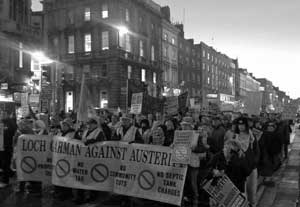 Roughly 1,000 people protested at the Dail last night as yet another austerity budget was debated. As with previous budgets the new flat rate taxes, PRSI & excise hikes will mean workers & those on low income will be hit hard while the richest 1% will hardly notice any difference.
Roughly 1,000 people protested at the Dail last night as yet another austerity budget was debated. As with previous budgets the new flat rate taxes, PRSI & excise hikes will mean workers & those on low income will be hit hard while the richest 1% will hardly notice any difference.
Political persecution continues in the North
The arrest and detention without bail of prominent Eirigi member Stephen Murney in Newry on bogus terror charges last week is part of a continuous campaign waged by the status-quo and its armed wing against growing dissent in Northern Ireland.

